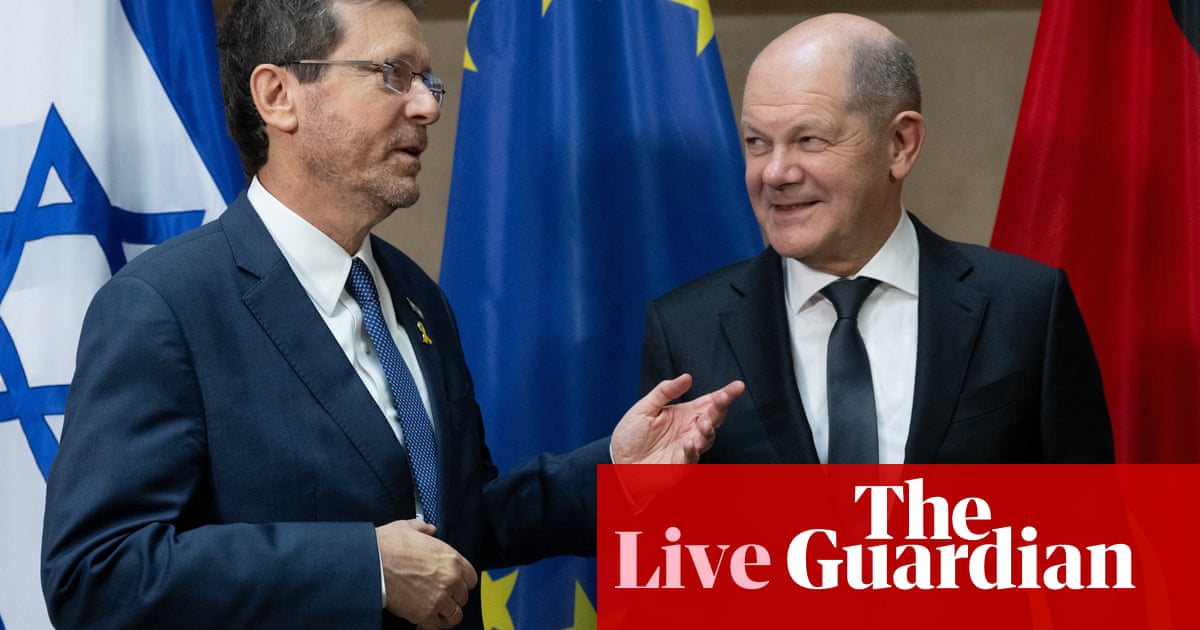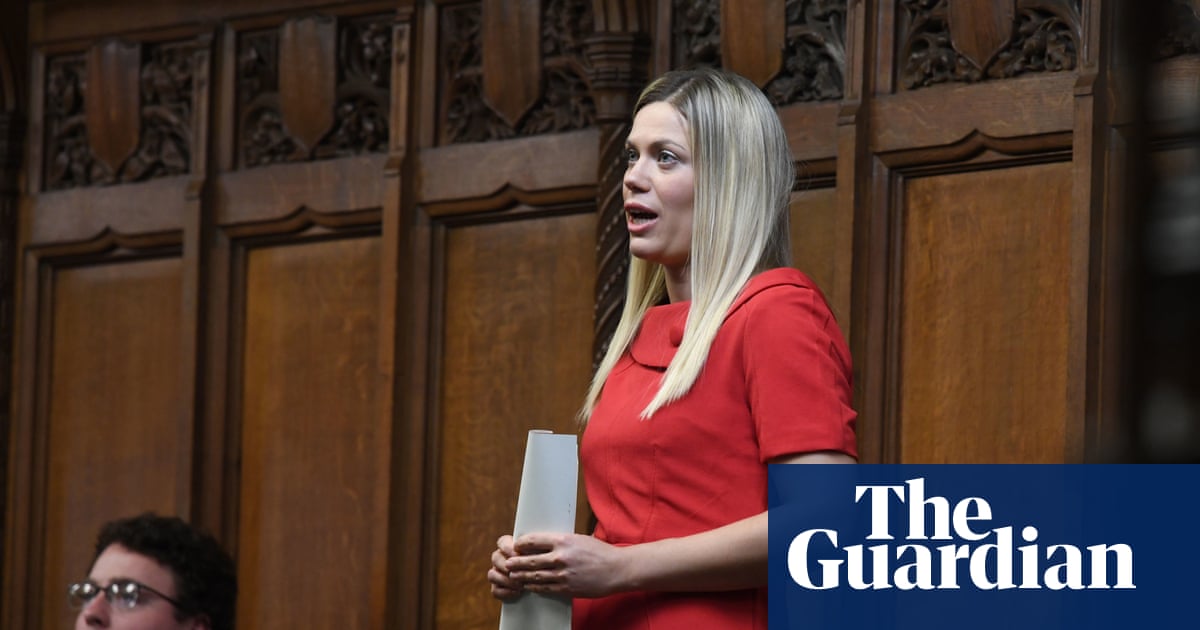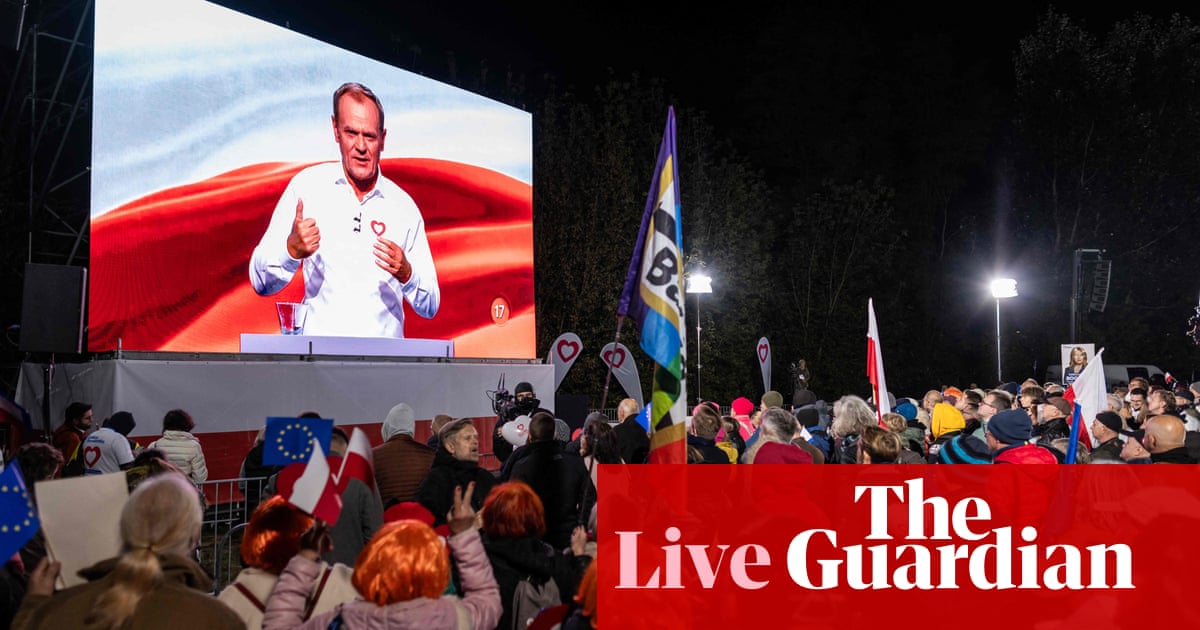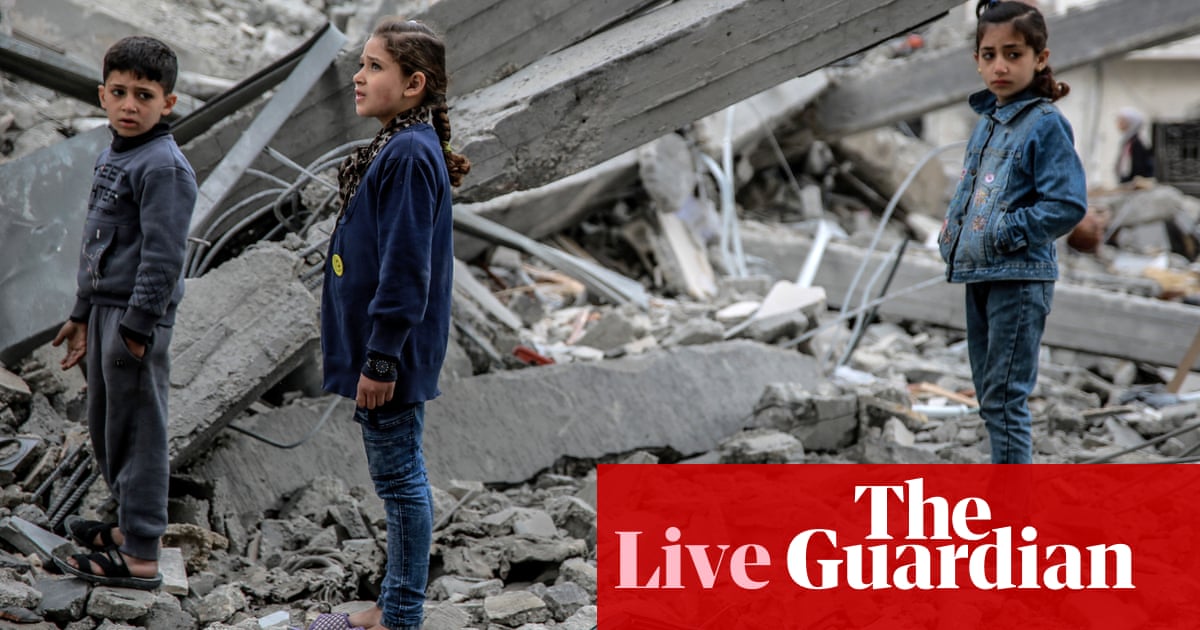
Return of hostages must be top priority, Israeli president says in Munich
Israel’s president, Isaac Herzog, is now on stage.
Asked about news reports that he met with Qatar’s prime minister in Munich and where negotiations stand to return hostages, the Israeli president said “this is the most important issue on the agenda.”
He acknowledged the presence of representatives of hostages’ families and former hostages in the audience, calling for the world to keep this a “top priority” on the agenda.
Herzog also said:
I met with the prime minister of Qatar yesterday. It was a good discussion. I think he’s doing a major effort, he’s taken major effort and devoting enormous focus on this issue. It’s complicated, it’s difficult.
One has to make sure that we know whether there is anybody who takes decision on the other side. After all, you are dealing with people who have been hidden and scattered all around Gaza, mostly in the tunnels.
“The most important thing for everybody to understand, if one wants to move on and find a horizon in this dire situation, which was initiated by Hamas, in cruelty of unprecedented record,” he said, “one has to resolve the issue of the hostages and bring them back home safely and as soon as possible.”
Summary of the day
Leaders, ministers, diplomats and experts met for the second day of the annual Munich Security Conference.
The day focused heavily on Russia’s war in Ukraine and the war in the Middle East.
The chief topic of conversation amongst the western defence establishment inside the gilded Hotel Bayerischer Hof was whether Ukraine’s problems are fixable – the answer is mainly yes – but only if the West has the political will to act.
Speaking at the conference, the German chancellor, Olaf Scholz, said Europeans need to do much more on security.
Volodymyr Zelenskiy, the Ukrainian president, told the conference participants that “2024 must become a time for a full restoration of a rules-based world order.”
The Ukrainian leader said that if Donald Trump visits Ukraine he would be ready to go with him to the frontline.
Zelenskiy also told world leaders not to fear Vladimir Putin’s defeat.
The European Commission president, Ursula von der Leyen, said the EU “has to step up its defence industrial base.”
David Cameron, the British foreign secretary, signalled that there would be “consequences” in the wake of the death of Alexei Navalny.
Germany’s Scholz said he was really depressed to hear of Navalny’s death.
Israel’s president, Isaac Herzog, called for the return of hostages to be a top priority. “The most important thing for everybody to understand, if one wants to move on and find a horizon in this dire situation, which was initiated by Hamas,” he said, “one has to resolve the issue of the hostages.”
Representatives of hostages’ families were in the audience in Munich as he made his plea.
Mohammed bin Abdulrahman Al-Thani, the prime minister of Qatar, said that when it comes to the prospects for a deal, “we made some good progress in the last few weeks in the negotiations” but “the last few days has not been progressing as expected, and I believe there are still differences.”
Israel’s Herzog said he had a “good discussion” with Qatar’s prime minister.
Asked about the prospect for normalisation with Israel, Faisal bin Farhan Al Saud, the Saudi foreign minister, said in Munich that “now, the priority must be ending the current humanitarian catastrophe that is happening in Gaza.”
Addressing the prospect of a possible Israeli operation in Rafah, Sameh Shoukry, Egypt’s foreign minister, told the conference that “any extensive military action there will have a devastating effect on the humanitarian situation.”
Antony Blinken, the US secretary of state, warned against “dehumanisation.”
Mark Rutte, the Dutch prime minister who is widely considered a frontrunner to become the next secretary-general of Nato, said we should “stop moaning and whining and nagging about Trump.”
Wang Yi, China’s foreign minister, said in Munich that Beijing wants to be a force for stability and that China and Europe should avoid “ideological distractions.”
Subrahmanyam Jaishankar, India’s minister of external affairs, defended his country’s approach to foreign policy, saying “life is complicated.”
In a speech today in Hungary, the country’s prime minister, Viktor Orbán, said it is on course to ratify Sweden’s accession at the beginning of its parliament’s spring session, which begins on February 26.
Israeli president "impressed" with Qatari prime minister
Asked about his sense of where negotiations stand, Isaac Herzog, the Israeli president, said at the Munich Security Conference that there’s “an international consensus amongst the main leadership that I’ve met here that this has to be done quickly.”
He added: “I was impressed that the prime minister of Qatar is very well-informed and involved in many details, also with the Egyptians. There’s a worldwide effort which is coordinated by the Americans as well, and the Israeli team, vis-a-vis the other side.”
The president also said:
I can’t analyse and tell you how much of a chance do I give to this effort. I do believe that there is an effort of major, I would say, of major weight involved, international weight. I do believe, and I can confirm, that it is an item of highest priority for the sides concerned in this process.
Return of hostages must be top priority, Israeli president says in Munich
Israel’s president, Isaac Herzog, is now on stage.
Asked about news reports that he met with Qatar’s prime minister in Munich and where negotiations stand to return hostages, the Israeli president said “this is the most important issue on the agenda.”
He acknowledged the presence of representatives of hostages’ families and former hostages in the audience, calling for the world to keep this a “top priority” on the agenda.
Herzog also said:
I met with the prime minister of Qatar yesterday. It was a good discussion. I think he’s doing a major effort, he’s taken major effort and devoting enormous focus on this issue. It’s complicated, it’s difficult.
One has to make sure that we know whether there is anybody who takes decision on the other side. After all, you are dealing with people who have been hidden and scattered all around Gaza, mostly in the tunnels.
“The most important thing for everybody to understand, if one wants to move on and find a horizon in this dire situation, which was initiated by Hamas, in cruelty of unprecedented record,” he said, “one has to resolve the issue of the hostages and bring them back home safely and as soon as possible.”
"Priority must be ending the current humanitarian catastrophe", Saudi minister says
Asked about the prospect for normalisation with Israel, Faisal bin Farhan Al Saud, the Saudi foreign minister, said in Munich that “now, the priority must be ending the current humanitarian catastrophe that is happening in Gaza.”
“So where we are now is, is we are focused on a ceasefire, we are focused on an Israeli withdrawal from Gaza, and we are focused on humanitarian access for the people of Gaza.”
He added: “It is absolutely unacceptable that we have not yet been able to resolve the simple issue of access for humanitarian goods into Gaza.”
“But I will say,” he added, “we are firmly convinced, that the only pathway towards security and stability for everyone in the region, including Israel, is through a Palestinian state, and that – once we have an end to the fighting in Gaza – will continue to be our focus.”
The Saudi minister said Palestinian statehood is “the right thing to do” but also “the pragmatic, correct thing to do for regional security and stability.”
Military action in Rafah would be "devastating", Egyptian minister says in Munich
Asked about a potential Israeli operation in Rafah, Sameh Shoukry, Egypt’s foreign minister, said at the Munich Security Conference:
The issue of displacement, which is a violation of international humanitarian law, whether it’s internal or external, cannot be tolerated.
Its consequences and the threats that it poses to Egypt’s national security are immense.
It puts a strain on our bilateral relations with Israel.
And we need to avoid the very tragic consequences on the civilians of Gaza who are now amassed – 1.3, 1.4 million – in the most densely populated area in the world.
You can imagine that any extensive military action there will have a devastating effect on the humanitarian situation. People are already suffering.
The Qatari prime minister, Mohammed bin Abdulrahman Al-Thani, said in Munich that he hopes “what happened after October 7 and the war in Gaza will represent a wake up call that the situation is not sustainable and we need to step up and to look at a better future for the people in the region, whether it’s the Palestinians, the Arabs, the Israelis, everyone.”
“We want to see a better future for everyone,” he added.
Addressing a question on Hamas, he pointed to the PLO as the representatives and said “the Palestinians, they have the same right as any other people or any other country to choose whoever is participating with them or not.”
"Time is not in our favour,” Qatari prime minister says of negotiations to end Israel-Hamas war
Mohammed bin Abdulrahman Al-Thani, the prime minister of Qatar, is on stage at the Munich Security Conference.
Asked about prospects for a deal in the war between Israel and Hamas, he said “time is not in our favour.”
He added:
We made some good progress in the last few weeks in the negotiations, and we been trying to reach an agreement between the two parties.
Yet, the last few days has not been progressing as expected, and I believe there are still differences.
He said that agreements always have two elements: addressing the humanitarian conditions and the number of people to be released.
I believe in this agreement we are talking at a bigger scale. And we still see some difficulties on the humanitarian part of these negotiations.
The prime minister also said:
If we are able to reach in the next few days some good conditions on that side, I believe that we can see a deal happening very soon.
Yet, the pattern in the last few days are not really very promising. But as I always repeat, you know, we will always remain optimistic.
Behind the Scenes
Beyond the speeches and panels, the Munich Security Conference is a networking event, where politicians, diplomats and experts bump into each other (sometimes literally) in the narrow, crammed hallways.
The result is senior figures from around the globe catching up, in bilateral meetings, coffee breaks and yes, in hallways.
The Guardian came across Belarus opposition figure Sviatlana Tsikhanouskaya and Romania’s foreign minister Luminița Odobescu, having an imprompu hallway chat.
Ukrainian minister outlines challenges with ammunition
Speaking at the Munich Security Conference, the Ukrainian foreign minister, Dmytro Kuleba, said Ukraine is facing two challenges with ammunition.
“The first one is the quality and sustainability of supply,” he said. “And the situation today is bad – and its not my political assessment, it’s the message we all receive from the frontline,” he stressed.
Another problem, he said, is that “because all of the howitzers and cannons of 155 calibre were produced specifically for certain type of this calibre – delivered, produced in a specific country – you cannot use the same round with every cannon of 155 calibre. So politicians tick the box and get credited for delivering these tons of rounds, but on the ground, it becomes a massive technological problem – to send the right round to the right cannon.”
Orbán says Hungary on course to ratify Sweden"s Nato membership
While Hungarian leaders are not present in Munich, Budapest’s move to drag out the ratification of Sweden’s Nato membership had fuelled frustration for western security officials over the past months.
In a speech today, the Hungarian prime minister, Viktor Orbán, said important steps have been taken to rebuild trust with Sweden and that Hungary is on course to ratify Sweden’s accession at the beginning of its parliament’s spring session.
The spring session is set to begin on February 26.
While leaders, ministers and experts debate at the conference, outside two parallel protests were talking place: a pro-Ukrainian demonstration and a pro-Palestinian march.
Antony Blinken, the US secretary of state, said he thinks “there is an extraordinary opportunity for Israel in the months ahead.”
“Virtually every Arab country” now “wants to integrate Israel into the region, to normalise relations if they haven’t already done so, to provide security assurances and commitments so that Israel can feel more safe and more secure,” he said.
“At the same time, there are genuine efforts underway, led by Arab countries, to reform, revitalise revamp the Palestinian Authority so that it can be more effective in representing the interests of the Palestinian people, and could be a better partner for Israel in that future,” Blinken added.
“And there’s also,” he said, “the imperative which I mentioned, that’s more urgent than ever, to proceed to a Palestinian state – one that also ensures the security of Israel and makes the necessary commitments to do so.”
Romanian minister cautions about risks in Black Sea region
Luminița Odobescu, Romania’s foreign minister who is attending the Munich conference, has said she is convinced Europe and the US will continue working together, while warning about risks for the Black Sea region.
“This year at the MSC we need to act resolutely in support of Ukraine and reaffirm the strength of the transatlantic bond,” she told the Guardian in a text message.
“At a time when war has returned to Europe, I am convinced that the EU-US joint action will continue, with positive, tangible effects for the security, resilience and prosperity of Europe, especially for the Black Sea region,” the minister said.
She added:
The war Russia continues to wage against Ukraine puts Black Sea security under great risk. Ukraine has succeeded to push back the Russian naval forces from Crimea and counter Russia’s drone attacks. I would like to commend their courage and sacrifice for defending their country. At the same time, resumption of Russian attacks against the Ukrainian ports in the Danube, increases the risks for us, for the Black Sea region, as these attacks happen at 400 meters from our border.
The minister also addressed the death of Russia’s opposition leader:
But the appalling news of the death of Alexei Navalny is another strident signal that Russian authoritarian regime is reckless in brutally silencing any dissidence. Freedom of speech is at risk wherever Russia acts. This is clear for all of us and this is why we ought to support Ukraine to win this war.
Blinken cautions against "dehumanisation"
Antony Blinken, the US secretary of state, warned that “the greatest poison in our common well is dehumanisation. And we see that in all directions. And if you lose sight of the humanity of someone else, then your heart is hardened to a point where anything is acceptable and anything is possible.”
He added that “part of our responsibility is to do what we can, to push back, to avoid, to call out dehumanisation wherever it’s coming from, in whatever direction, because if we can’t get at that, it’s very hard, if not impossible, to do other things.”
In Munich, Ukraine’s foreign minister, Dmytro Kuleba, met with G7 foreign ministers and said he urged them “to swiftly move forward with decisions regarding the confiscation of frozen Russian assets and their use for Ukraine’s recovery and defense.”
“Russia must pay,” he said.
Inside the conference hotel: questions on political will to help Kyiv and shock at Navalny"s death
The chief topic of conversation amongst the western defence establishment inside the gilded Hotel Bayerischer Hof is whether Ukraine’s problems are fixable – the answer is mainly yes – but only if the West has the political will to act.
But many remain shocked at the capacity of Vladimir Putin to be brutal.
The news of Alexei Navalny’s death on the opening day of the Munich Security Conference is not seen as a coincidence, but instead a cynical message by Putin to the West that he is in charge and utterly immune to its constraints.
Putin will have known his wife Navalny’s wife Yulia was attending the conference and thought he would remind all those Nato men in their uniforms a cruel message that he does not play by their rules.
One of the difficulties for the supporters of Ukraine is the Munich Security Conference is the quintessential event designed to attract the transatlantic defence establishment, and hence Kyiv’s most ardent backers.
Republican isolationists by their nature do not travel to Munich and Lindsay Graham, the Republican Senator and for many years the leading Republican backing Volodymyr Zelenskiy last week defected, bending the knee to Donald Trump, and deciding not to make the trip to Germany for the first time in more than a decade.
Speaking to the former Speaker Nancy Pelosi – omnipresent at the hotel – may be pleasant, but she changes few of the minds that matter.
That leaves Zelenskiy and Nato commanders wondering how best to find some way through guilt or appealing to self-interest to the voices that matter on the Hill, blocking aid.
Nato Europeans feel they have put their own house in order and finally set an example pointing to the 18 Nato countries in Europe now meeting the 2 % target. But they realise it is not enough, and many delegates are left scratching their heads how the Republican Party still needs persuading that allowing Putin to win in Ukraine is not in the US self-interest.
In seeking new arguments European politicians point to the bipartisan belief in the US about the threat posed by Iran, and how Ukraine’s defeat would benefit Tehran, or set an example of weakness to China.
Zelenskiy himself tried gently to mock the self indulgence of Republican politicians that have blocked a decision on the aid package for Ukraine, partly by going on a two week holiday.
“Please remember, everyone, that dictators don’t go on vacation. Hatred knows no pause. Enemy artillery is not silent due to procedural troubles. Warriors opposing the aggressor need sufficient strength,” the president said.
Initially reluctant to discuss the Republican mindset, his headline grabbing invitation to Trump to come to Ukraine’s frontline came as a result of a question about whether he would invite Trump to Kyiv. He went one better offering to take him to see real war, a delphic reference to Trump’s draft dodging.
The men bearing uniform here, and their advisers insist in public Ukraine has the ability to last the year, and not see its frontlines collapse.
Even in private briefings, senior western officials insist they do not share the narrative of hopelessness or that Article 5 – the one for all raison d’être of the Nato charter – is under threat from Moscow.
Yes, Putin is internally secure, his leadership group stable, and he has less to lose than say five years ago, but if given the weapons Ukraine needs, Ukraine can thrive.
In short: It is one thing to say it is fixable, but another to know if the politicians have the capacity to fix.
"Life is complicated", Indian minister says in response to foreign policy critique
Subrahmanyam Jaishankar, India’s minister of external affairs, has defended his country’s approach to foreign policy.
Sitting next to his American and German counterparts, he said in response to a moderator’s question:
Your question, do we have multiple options, answer is yes.
Is that a problem? Why should it be a problem, if I’m smart enough to have multiple options, you should be admiring me, you know, you shouldn’t be criticising.
Now, is that a problem for other people? I don’t think so, I don’t think so – certainly in this case, and in that case, because, look: we try to explain what are the different pulls and pressures which countries have.
And it’s very hard to have a unidimensional relationship.
Now, again, different countries and different relationships have different histories.
If I were to look say, between the US and Germany, it is rooted, you know, there’s alliance nature to it, there’s a certain history on which that relationship is grounded.
In our case, it’s very different.
So, I don’t want you to even inadvertently give the impression that we are purely, you know, unsentimentally transactional. We are not. We get along with people, we believe in things, we share things, we agree on some things.
But you know, there are times when, you know, when you’re located in different places, have different levels of development, different experiences – all of that gets into it.
So life is complicated, life is differentiated.
Addressing Washington’s relationship with Beijing, Antony Blinken said he just met his counterpart in Munich, following other meetings.
Yes, we have a competition.
There are areas where we are contesting each other.
But there are also areas where we can and should cooperate because it’s in our interest to do that.
Antony Blinken said that “when it comes to strategic competition, and there is no doubt that we have one with China, there are a few things to be said: first, we have an obligation to manage that relationship responsibly, and I think that’s something that we hear from countries around the world, and it’s clearly in our interest to do so.”
He added: “When it comes to other countries, the point is not to say to country X, Y or Z, ‘you have to choose’, the point is to offer a good choice.”
The US secretary of state, Antony Blinken, said that it is in America’s interest to invest in its alliances.
“If you’re not at the table in the international system, you’re going to be on the menu,” he said.
Antony Blinken, the US secretary of state, has joked that the Munich Security Conference is known as “speed-dating for diplomats.”
Annalena Baerbock, the German foreign minister, said at the Munich Security Conference that “most of the countries, they know, that the Charter of the United Nations, the rule of law, is their life insurance.”
"Alexey"s body is not in the morgue", spokesperson says
Meanwhile, in Russia: Alexei Navalny’s spokesperson says his body is not in the morgue.
Speaking of the situation in the Middle East, Wang Yi, the Chinese foreign minister, said that “to address the Red Sea issue, the root cause must be resolved, and the root cause is the ongoing fighting in Gaza.”
He added:
China’s position is clear on that: first, an immediate ceasefire must be realised. No more fighting.
And second, to make sure the humanitarian corridors are unimpeded.
And third, hold an international peace conference as soon as possible to revive the two-state solution.
We cannot allow this humanitarian disaster to continue any more.












